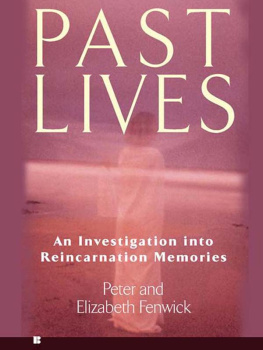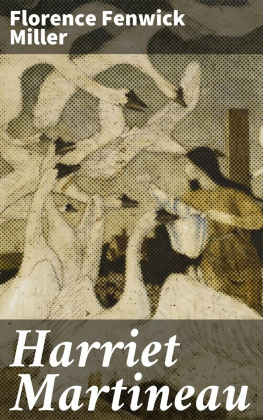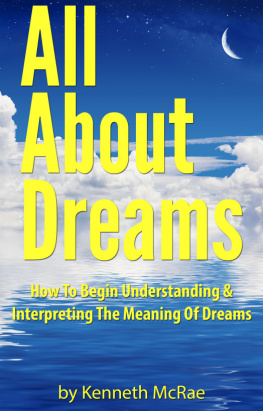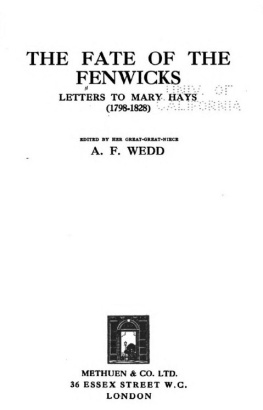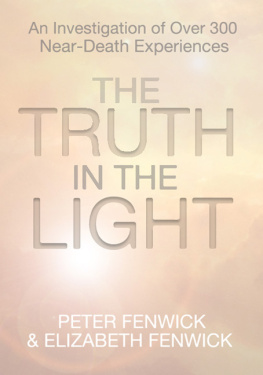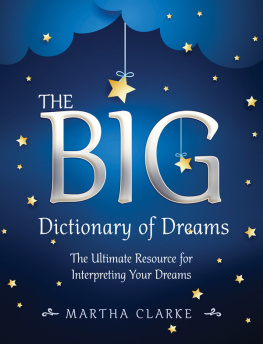Peter Fenwick - The Hidden Door: Understanding and Controlling Dreams
Here you can read online Peter Fenwick - The Hidden Door: Understanding and Controlling Dreams full text of the book (entire story) in english for free. Download pdf and epub, get meaning, cover and reviews about this ebook. year: 2020, publisher: White Crow Productions Ltd., genre: Religion. Description of the work, (preface) as well as reviews are available. Best literature library LitArk.com created for fans of good reading and offers a wide selection of genres:
Romance novel
Science fiction
Adventure
Detective
Science
History
Home and family
Prose
Art
Politics
Computer
Non-fiction
Religion
Business
Children
Humor
Choose a favorite category and find really read worthwhile books. Enjoy immersion in the world of imagination, feel the emotions of the characters or learn something new for yourself, make an fascinating discovery.

- Book:The Hidden Door: Understanding and Controlling Dreams
- Author:
- Publisher:White Crow Productions Ltd.
- Genre:
- Year:2020
- Rating:3 / 5
- Favourites:Add to favourites
- Your mark:
- 60
- 1
- 2
- 3
- 4
- 5
The Hidden Door: Understanding and Controlling Dreams: summary, description and annotation
We offer to read an annotation, description, summary or preface (depends on what the author of the book "The Hidden Door: Understanding and Controlling Dreams" wrote himself). If you haven't found the necessary information about the book — write in the comments, we will try to find it.
The Hidden Door: Understanding and Controlling Dreams — read online for free the complete book (whole text) full work
Below is the text of the book, divided by pages. System saving the place of the last page read, allows you to conveniently read the book "The Hidden Door: Understanding and Controlling Dreams" online for free, without having to search again every time where you left off. Put a bookmark, and you can go to the page where you finished reading at any time.
Font size:
Interval:
Bookmark:
THE
HIDDEN
DOOR
Understanding
and
Controlling Dreams
The Hidden Door
Original Copyright 1997 by Peter and Elizabeth Fenwick.
This edition: Copyright 2020 by Peter and Elizabeth Fenwick All rights reserved.
Published in the United States of America and the United Kingdom by White Crow Books; an imprint of White Crow Productions Ltd.
The right of Peter and Elizabeth Fenwick to be identified as authors of this work has been asserted by them in accordance with the Copyright, Design and Patents Act 1988.
No part of this book may be reproduced, copied or used in any form or manner whatsoever without written permission, except in the case of brief quotations in reviews and critical articles.
For information, contact White Crow Books by e-mail: .
Cover Design by
Interior design by
Paperback: ISBN: 978-1-78677-125-4
eBook: ISBN: 978-1-78677-126-1
Non-Fiction / Body, Mind & Spirit / Dreams / Parapsychology
www.whitecrowbooks.com
Disclaimer: White Crow Productions Ltd. and its directors, employees, distributors, retailers, wholesalers and assignees disclaim any liability or responsibility for the authors statements, words, ideas, criticisms or observations.
THE
HIDDEN
DOOR
Understanding
and
Controlling Dreams
by
PETER and ELIZABETH
FENWICK

www.whitecrowbooks.com
ALSO BY THE AUTHORS:
Past Lives: An Investigation into Reincarnation Memories
The Truth in the Light: An Investigation of Over 300 Near-Death Experiences
The Art of Dying
Shining Light on Transcendence: The unconventional journey of a Neuroscientist
To everyone whose dreams contributed to the making of this book, with our thanks, and to Huw, Oliver and Sebastian in the hope that the best of their dreams will come true
Authors Note
The authors wish to make clear that the use of the first person singular refers to Dr Peter Fenwick only. Where he has been used in the abstract sense, it should of course be taken to mean he/she.
Contents
The dream is the hidden door in the deepest and most intimate sanctum of the soul.
Carl Jung
Accounts of dreams are as old as human history. People have always been fascinated by their own dreams, and have always looked for significance in them. From the most ancient civilisations of the Assyrians and Babylonians through to Biblical times it was believed that dreams brought messages from the gods in the form of warnings, omens and portents. In ancient Greece they were seen as prophecies, or instructions from Zeus.
Wherever dreams are taken seriously, regarded as meaningful and revelatory, interpreters of dreams are valued. In early cultures people relied on shamans, priests and wise men to tell them the meaning of their dreams. There are countless examples of dreams and dream interpretations in the Bible in fact dreams seem to have been the preferred medium through which the Almighty conveyed his intentions, instructions or displeasure to his chosen people. In Biblical times the Jews were revered as dream interpreters by both the Egyptians and the Babylonians. Although Josephs meteoric rise to power was clearly due not only to his talent for dream interpretation, but also the native wit that allowed him to turn matters to his own advantage (Now therefore let Pharaoh look out for a man discreet and wise and set him over the land of Egypt ), he had already earned the respect of his peers as a dream analyst.
Other notable Jewish dream analysts followed. When King Nebuchadnezzar had a dream that troubled him, all the wise men of Babylon the magicians, the astrologers, the Chaldeans and the soothsayers failed to interpret it. It was left to the Israelite prophet Daniel to interpret the dream as predicting the kings imminent seven years of madness: They shall drive thee from men and thy dwelling shall be with the beasts of the field; they shall make thee to eat grass as oxen and they shall wet thee with the dew of heaven. A sense of delicacy may have stopped him adding to the good news by pointing out that the mad king was also to have, as it transpired, hairs grown like eagles feathers, and his nails like birds claws.
Throughout the ages certain places have been associated with dreams that have special properties or give prophetic information. The Celtic seer would wrap himself in an animal skin and sleep beside a waterfall in order to have a prophetic dream. Dream oracles were used by the Greeks to facilitate dream communication with the gods. Temple dreaming, or incubation the practice of sleeping at one of these holy places in order to encourage significant dreams was a well-recognised and highly organised activity. Over 400 of these temples existed in Ancient Greece, many dedicated to Aesculapius, the god of healing. Here the sick would come, first of all to undergo rites of purification (including abstention from eating meat or fish and having sex), then to sleep in a special cell in the belief that Aesculapius himself might be induced to visit them in their dreams and prescribe a treatment or even perform a surgical operation upon their sleeping body. The philosopher Aristides, seeking such a cure in the middle of winter and in extremely cold weather, was told by the god to bathe outdoors. He was, it is said, filled with well-being after taking the advice.
It is possible that some of the dreams that were dreamed at these sacred sites were drug-induced. It has been suggested that during some of the religious ceremonies held at the sites, psychedelic drugs might have been used to induce altered states of consciousness as part of the ritual. Our current understanding of altered states of consciousness, particularly from studying such drugs as LSD, psylocibin and mescalin, shows that characteristic patterns are seen under the influence of such drugs, which take the form of circles, spirals and expanding geometric forms, and seem to be independent of culture and person. Freelance researcher and writer Paul Devereux and his colleagues have found that patterns carved on the walls of caves in sacred sites are very similar to the patterns induced by psychedelic drugs.
The Egyptians were probably the first to try to develop a system of dream interpretation and to incorporate individual dream symbols. They believed that dreams could be interpreted paradoxically: apparently happy dreams were omens of disaster; nightmares presaged good times to come. They also believed that dreams came from good and evil spirits, and used herbal remedies and spells to encourage the good and deter the bad.
With the Greeks a whole literature of dream interpretation developed, based on symbols and on the belief in the prophetic nature of dreams. The Greeks regarded as meaningless any dream that clearly had its origins in events or desires in the dreamers daily life. However, some dreams that we would see as obvious candidates for psychological interpretation for example, a dream (common, according to Sophocles) of sleeping with ones mother, the Greeks usually interpreted symbolically, and regarded as auspicious. Only Plato and Artemidorus anticipated the twentieth century and Freud by suggesting that wish-fulfilment might play a part in such dreams. Artemidorus, a soothsayer of Ephesus during the second century AD, deserves a special mention in the annals of dream research and interpretation. His four-volume work Oneirocritica (The Interpretation of Dreams) is a compendium of ancient superstitions and draws together the works of earlier authors. He was one of the first to recognise the importance of the dreamers personality in dream interpretation.
Font size:
Interval:
Bookmark:
Similar books «The Hidden Door: Understanding and Controlling Dreams»
Look at similar books to The Hidden Door: Understanding and Controlling Dreams. We have selected literature similar in name and meaning in the hope of providing readers with more options to find new, interesting, not yet read works.
Discussion, reviews of the book The Hidden Door: Understanding and Controlling Dreams and just readers' own opinions. Leave your comments, write what you think about the work, its meaning or the main characters. Specify what exactly you liked and what you didn't like, and why you think so.

